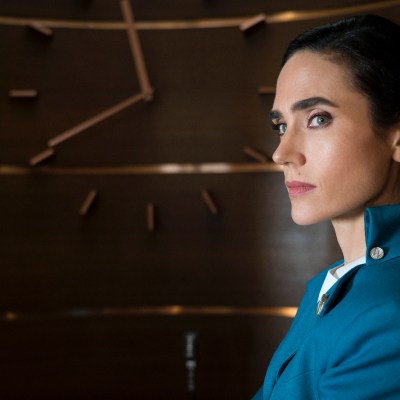Snowpiercer Episode 3 Review: Access is Power
The openings aren't the only things cold in Snowpiercer as film noir detective mystery meets mismatched buddy cop scenario in episode 3.

This Snowpiercer review contains spoilers.
Snowpiercer Episode 3
One of the smartest things Snowpiercer has done with its first season is, as characters gain prominence in the story, offer up some cold openings. In this case, Dr. Klimpt (Happy Anderson) is the one discussing how the economy of Snowpiercer functions. Not the buy-ins of the first class passengers, but the real economy that shuttles drugs from third class to first class and back again, trading drugs for gold for sex for the most important thing of all, access.
All things that people kill, and have been killed for, on a train that’s 1,001 cars long. It’s exposition, and it’s needed exposition for the world the show is building, but by and large it’s been done stylishly and provides a bit of insight into the character giving the explanation that is necessary to flesh out secondary characters like the good doctor.
The good doctor just might be the drug connection for the entire train. Though Klimpt has not directly synthesized Kronol, he’s certainly one of the root causes of the drug epidemic, which stretches from the tail to first class by the looks of things. I guess marijuana is too intensive to grow, but anybody with a sink and an oven can create meth, or whatever Kronol happens to be a stand-in for.
Another thing that I appreciate about Snowpiercer is that, at its core, it’s a film noir married to a police procedural. It’s two detectives, Layton (Daveed Diggs) and Till (Mickey Sumner) investigating a murder. One is motivated by duty, because she was part of the investigation that put the wrong woman in the Drawers, and the other is motivated by that classic film noir motivator, cash money. In this case, cash is a ticket out of the tail and the carrot of improved conditions for the train’s work force. The person who gave our noir detective the case is a mysterious femme fatale who gets him involved in something far bigger than he’s prepared for, in the form of Jennifer Connelly’s Melanie. It’s a classic set-up, and it’s a classic for a reason.
Even draped in sci-fi trappings and wrapped up in a class war, the formula works. The fact that Daveed Diggs is just so bloody charming only helps the thing function, because without his blend of charisma and sarcasm, it wouldn’t be nearly as entertaining. Diggs deadpans his way through the episode, always bending but never breaking under the demands given to him by Melanie and company, all the while willing to throw it all away to go back to the tail and his normal life despite the offered carrots. The fact that he’s constantly getting beaten up or having a bag thrown over his head to move him to different parts of the train? Diggs is nothing if not a classic noir detective, even if his interrogation scenes and mismatched partnership with Till feel like something out of Law and Order: SVU.
It works well, because the script from Lizzie Mickery doubles down on the class issues inherent in Snowpiercer. Till and Layton struggle for control in the investigation, because one has the experience and the other isn’t a tailie. The cross-class romance between Till and Jinju (Susan Park) is logical, but there’s just enough experience in dealing with Melanie to have Jinju tell Till to back off, and enough aspirational motivation to have Jinju—who already works in the first class areas—to turn informant on her girlfriend to Melanie. Jinju, like Layton, harbors dreams of rising in station—there’s always someone looking to claw their way to a better life in Snowpiercer, and someone working just as hard to keep the poor down where they belong, be it Lilah Folger (Kerry O’Malley), Ruth (Alison Wright), or anyone else.
The cold opening establishes that Snowpiercer, despite being tight quarters, is designed to separate, and ensure that people remain apart, and that in turn creates both loneliness and class division. Nowhere is that more evident than in the big boxing fight that takes place in the Night Car. Sam Miller wisely films it from two angles, a floor view, and a view from the luxury of the balcony where first class is allowed to sit and watch the entertainment. The boxing match itself is fine, but the first class passengers really perk up when second and third class start brawling with one another in the wake of the fight, and when the brakemen and jackboots move in to break up the violence. Snowpiercer isn’t subtle; several characters basically say that the show is about class war and that point is repeated quite a lot. However, that bit of focus, showing Kerry O’Malley literally sit up in her seat and lean in for a better view, is a subtle touch that pays off in terms of pointing out just how the upper class views those around them.
The boxing match is just a show, a distraction for people who are in dire need of something fun to take their minds off of the fact beef is no longer what’s for dinner. It provides hope for second and third class that one day, they can figure out a way to rise up the ranks and join the life of luxury that they can see, but literally are unable to access from the ground floor. Even Terence (Shaun Toub) can’t match that level of poshness, despite being the most powerful person not named Melanie on the train due to his control of the black market economy. Access is not the same as acceptance.
That specter of self-improvement remains one of the most powerful weapons in Melanie’s arsenal when it comes to maintaining control of the train. From the tail to the tip, the chance for a better life and the fear of losing the good life, keeps all 3000 passengers on board Snowpiercer in line. More or less in line, that is. At a certain point, people with nothing to lose but their lives stop trying to protect those lives. It’s the age-old question: is it better to die on your feet or live on your knees? Increasingly, it looks as though the tailies are determining their answer, and it’s not one the first class passengers will like.


